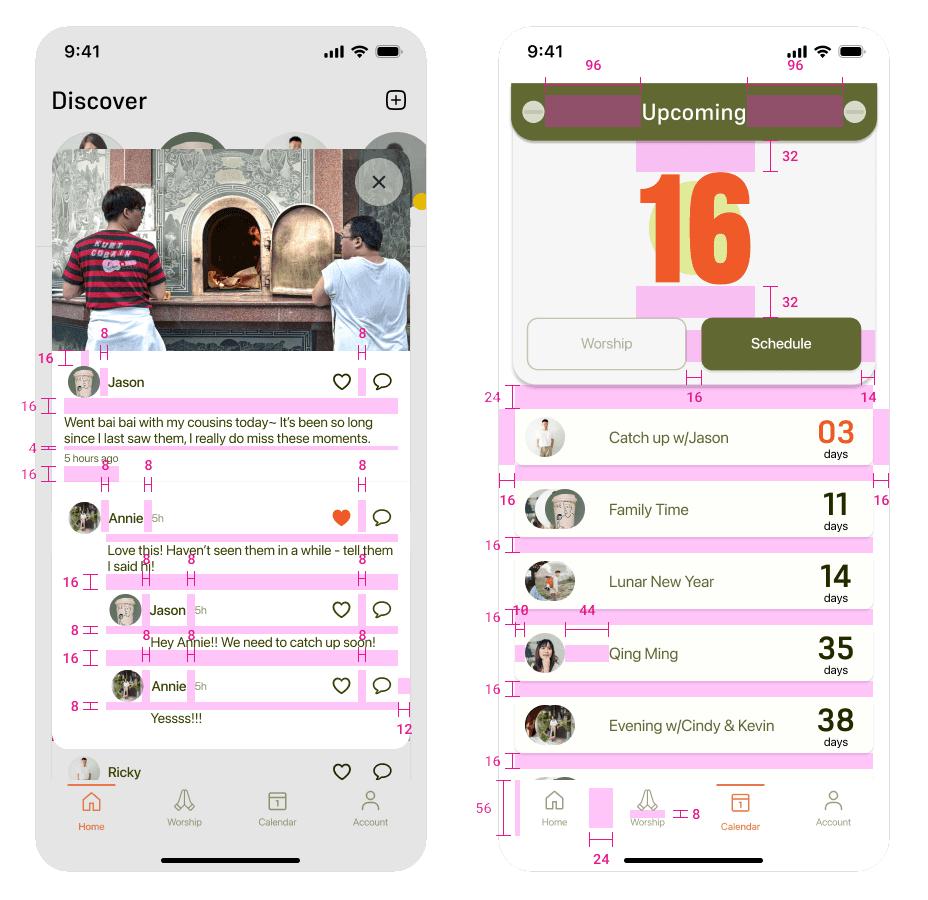Bai
My Role
End-to-end product design
Project Timeline
Oct – Nov 2023
(10 weeks)
Tools
Figma, Photoshop, Illustrator, Procreate
Project Overview
What is Bai?
Bai is a educational social media app that encourages Taiwanese people, especially second/third culture adults, to retrace their cultural roots through education and interaction with series of traditional Taiwanese activities. Bai makes it more accessible to users to learn about their cultural heritage by turning these physical activities in interactive digital forms and providing the ability to form communities.
Background
With each passing generation, there is an increase in Taiwanese population living abroad - many of whom have disconnected from their Taiwanese culture due to cultural assimilation and other reasons. These people have a desire to reconnect with their cultural roots, but with this generation known for working long hours, they struggle to find time to do so whilst balancing their busy lifestyles.
Pain Point
Difficulties finding cultural information
which discourages users from exploring their cultural roots.
User
Young Taiwanese Adults
are the primary users, with a focus on third culture people.
Goal
Provide easy access to cultural information
so users can be educated on their cultural heritage.
Solutions
Key Features

Staying educated
Bai provides information on various Taiwanese cultural customs and traditions. Users are able to stay informed on the meanings behind them and the value they carry, while practising them and enriching their experiences.
Sharing with your community
See what your friends and family are sharing about their lives and cultural roots. Form communities of shared interests and values.

Schedule future events
Stay up to date with the latest cultural events and socialise with your community through cultural activities to foster meaningful relationships.
Discover
How this came to be...
As a Taiwanese, raised in the UK, I always wanted to explore my cultural upbringing to stay in touch with my heritage. However, I often struggle to find useful and relevant information about Taiwanese traditions and culture. Being in a not-so-diverse community also prevented me from sharing similar cultural values and interests so I wanted to tackle this problem space.
My Research Approach
To analyse the problem space, I conducted primary, secondary and ethnographic research to collect my findings. A varied range of research methods is important to have an informed understanding of the existing context and avoid biases.
Film Analysis
Many Taiwanese and Chinese films involve cultural elements that people can relate with and serves as educational scenes to inform them.
Journals & Articles
Reading journals and articles provided a good foundation before conducting other research methods.
Online Interviews
I interviewed Taiwanese and East Asian individuals to better understand the culture and traditions.
Surveys
Asking Taiwanese people for their experiences helped me understand the problem space more clearly.

Understanding this Problem Space
Before diving into the problem, context was needed to understand the different sociocultural factors in play. I explored two demographics that posed different situations and lifestyles, whilst highlighting their individual pain points. I analysed the population residing in Taiwan, as well as Taiwanese living overseas since they would face different problems.
Focus Group: Taiwanese Residents
Identifying Existing Pain Points
Generational differences
Older generations follow many traditions intently, while a large portion of the younger population lack knowledge of traditional Taiwanese culture, only practising them from their upbringing.
Traditional values still play an important role in Taiwan
with many still practising daily rituals.
90%
of Taiwanese adults paid a visit to a temple or shrine.
30%
of them visit at least once a month.
Lack of time
With Taiwan being one of the highest for working hours clocked annually at 2000+ hours, people struggle to find time to stay connected with their cultural roots.
This data led to an interesting find…
471% increase in digital worshipping
For those who struggle to find time to worship at temples, many have opted for digital worshipping instead, which saw an increase from 7,000 to 33,000 between 2019-2020.
Focus Group: Taiwanese Overseas
Discovering new pain points
For Taiwanese people living abroad, they experience different problems compared to those residing in Taiwan. As a result, a focus is needed to highlight what can be addressed to alleviate their pain points. Through researching, I have discovered that many encounter struggles with identity and not having access to Taiwanese cultural information.
Key interview insights
To better understand the problems people face, I interviewed 10 Taiwanese adults aged 18-31 to gain more valuable insights. The interviewees vary between Taiwanese residing in Taiwan and Taiwanese living in the west.
Interviewing Taiwanese individuals helped me highlight three key pain points they had regarding their connection with Taiwanese culture and their struggles.
Retracing their cultural roots
Large population don’t know why they worship but want to stay in touch with their cultural heritage.
Lack of convenience
People are busy with their lives, leading to less time with their families and friends.
Community of shared values
Many abroad feel there isn’t a community for them to share their cultural values with.
Define
Problem space
Using my findings, I highlighted any overlapping pain points, sorted them into themes and identified 3 key issues to tackle within this problem space.
Busy lifestyles
People still wanted to stay connected with their cultural roots but prioritise convenience due to their busy schedules.
Lack of resources
People overseas lack the knowledge to find resources to learn about their culture, whilst Taiwanese residents prefer to have information readily available for their convenience.
In need of a community
People want to find a place and community to share their experiences for Taiwanese heritage and feel valued and connected.
Problem
How might we support young Taiwanese adults to find relevant cultural information to stay in touch with their heritage, while they continue with their busy lifestyles?
Develop
Brainstorming and Identifying MVP's
Using the key themes in this problem space, I identified 3 design goals and user flows to pursue when approaching my design solutions.
Simplicity
Make information easy to access and digest.
Community
Creating a platform to share cultural interests and values.
Nostalgia
Using familiar Taiwanese design elements to engage users and form a relationship between them and Bai.
Reduce no. of screens between actions
to prevent users from having cognitive overload.
Introduce a feed for sharing posts
and allow like and comment features to foster a close-knitted community.
Create visual cues representing Taiwanese elements
that users are already familiar with that creates playful interactions in the app.

UI Development & Features
For design inspiration, I took from different sources such as using a traditional Taiwanese calendar (present in many households) for the main visual feature in the app. This was to provoke a nostalgic cord that is familiar for Taiwanese users.
I chose colours that have important cultural meanings, but also existing colour associations of certain actions within digital design.
Deliver
Testing and iterating with users
I conducted 10 usability tests over 2 rounds, in-person and online. From the results, the app was well received, with all the participants enjoying the different but unique, interpretation of worshipping. The tests helped identify some areas for UX improvement, which I resolved before concluding my finals designs.
Cultural Customs Selection
Social Feed & Scheduling Events
Key Features

Your Taiwanese calendar
There is the ability to schedule sessions and set reminders ahead of time to accommodate people with busy lifestyles. A calendar is also visible on the home screen to keep users informed on upcoming events and dates.
Socialise with your community
Bai provides information on various Taiwanese cultural customs and traditions. Users are able to stay informed on the meanings behind them and the value they carry, making their experiences more meaningful.

Curate your timeline
There is the ability to schedule sessions and set reminders ahead of time to accommodate people with busy lifestyles. A calendar is also visible on the home screen to keep users informed on upcoming events and dates.
Practicing traditions and customs
Users are able to share their posts of their experiences onto a community feed for friends and family to see and interact with. By sharing each other’s experiences, users can foster a community with value.
Closing Thoughts
What went well?
Reflecting back, I think the iteration process was quite successful considering the timeframe. Through testing and reiterating, I was able to come up with features in the app that I had not considered at the beginning. This was only possible by constantly taking a step back to look at the bigger picture of the product. Holistically looking at the solution ensured I was focused on the must-haves of the product that will directly benefit the user as opposed to ‘wants’ that were not needed at all.
What could have been better?
I would have liked to conduct more usability testing, especially with the demographic of my app. I believe it would have been insightful to gain a better understanding of whether some features were really necessary or if they were “nice to haves”.
What would I have done differently?
I would have liked to conduct more usability testing, especially with the demographic of my app. I believe it would have been insightful to gain a better understanding of whether some features were really necessary or if they were “nice to haves”.





















